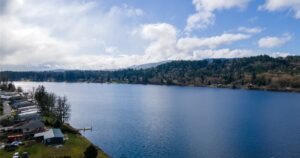New stewards for Black Lake
Building on its experience and advocacy for cleaning up Black Lake, Citizens for a Clean Black Lake has applied for non-profit status as the Clean Black Lake Alliance (CBLA). CBLA is dedicated to educational and environmental research and remediation of Black Lake and its watershed.

Uncovering a lost past
At a March program at the Black Lake Grange, CBLA members introduced an audience to the lake’s geological, native American and early settler history. One surprising revelation was the existence of a 1920s proposal to use the lake as part of a ship channel from Budd Inlet to Aberdeen and the ocean via the Black and Chehalis Rivers. The early settlers’ accounts of the pristine waters, abundant and diverse presence of fish and wildlife. reminded listeners of what has been lost and what members active in CBLA seek to restore.
Pooling resources and expertise
Thurston County currently has two Lake Management Districts–Lake Lawrence and Long Lake–with two more proposed at Lake Offut and Lake Pattison. These districts were formed to address problems of aquatic weed and algal control — the same conditions that plague Black Lake (among other lakes around the world). CBLA would like the County to take an integrated approach that pools resources and expertise in a County-wide lakes management program with active community engagement.
There are healthier ways
As part of this goal of restoring a healthy ecosystem to Black Lake, Citizens for a Clean Black Lake advocates for reduction of aluminum sulfate, glyphosate and other herbicides for controlling algae and aquatic weeds, and seeks alternative methods of control that improve water quality and the lake ecosystem. Mechanical harvesting, for example, is one such method where the harvested plant material could also be used to make high grade compost sold to County residents and public projects.
There’s research to be done!
CBLA will be working with the County’s Healthy Lakes Program to propose research and innovative low-cost projects to improve water quality. One such project uses biochar to filter septic effluents before they enter the lake. Others will advocate pursuing research to intercept stormwater runoff before it enters the Lake along with tracking the connection between declining fish populations and increased algal blooms that cause water to turn green.
CBLA is interested in partnering with citizen scientists and environmental professionals—active or retired—who would like to participate in research into sustainable solutions to the problems posed by weed control and septic and stormwater pollution. It also welcomes participation from residents of other county lake management districts to help develop solutions to the environmental consequences of expanded and expanding urban development.
To contact CBLA about upcoming events, or to join the email list, please write to CBLAoly@gmail.com
| CBLA will sponsor an event in July at Kennydale Park with Thurston County, covering the ecology of Black Lake, paths to lake restoration and stewardship opportunities. |
Lead on, Esther! Hope you get the research assistance you need. Remember – we’ve got some new Commissioners on the way.